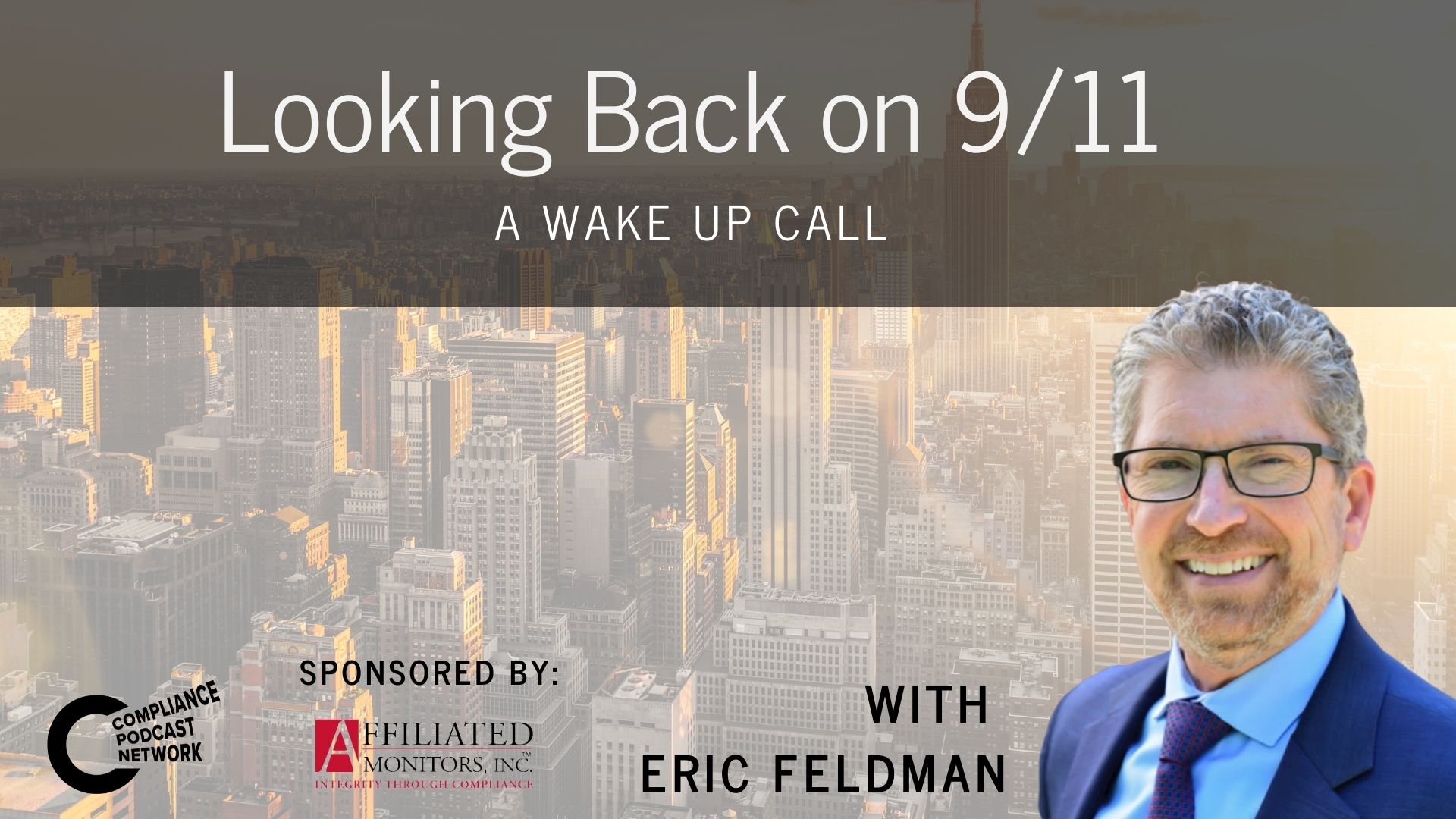Today, the Compliance Kitchen looks at what ingredients go into a request for an administrative review of an anti-dumping or countervailing duty order.
Day: September 9, 2021

In this episode of The Ethics Experts, Nick welcomes Lorena Acosta, personal brand consultant, to the show.

Jay Leib is Executive Vice President of Innovation and Strategy at Reveal, an eDiscovery review company. Jay was previously the Chief Strategy Officer at kCura before he founded NexLP, a pioneering AI company in Chicago that was acquired by Reveal. He joins Vince Walden to talk about the work Reveal has been doing, and investigation and eDiscover programs.
By the year 2010, data had become much larger than human beings could get through in an efficient manner. It was for this reason that Reveal was founded, as well as to perform as an alternative to Relativity. Reveal’s mission is to help end users, law firms, in-house corporations, investigators and international consultancies “get through whatever their obligation is, as far as data goes, as fast as possible, while finding the key insights and key stories as fast as possible.”
After acquiring a company called Brain Space, Reveal created what they call an ‘AI model library.’ Their data science team has built AI models to target specific issues within data to get important documents into the hands of investigators as quickly as possible. AI models have also been built to look for issues surrounding unethical and fraudulent behaviors.
Resources
Jay Leib on LinkedIn | Twitter
NexLP.com

Eric Feldman is Tom Fox’s guest on this episode of Looking Back at 9/11. Eric is the Senior Vice President and Managing Director at Affiliated Monitors, a company that deals with monitoring large and small companies in the government contracting, construction, engineering, manufacturing, and financial services. He also conducts assessments of corporate ethics and compliance programs across many countries. Eric joins Tom to talk about the impact the events of 9/11 had on the role of Inspector General.
The Impact of 9/11 on The IG’s Role
Eric explains to Tom that 9/11 was the most informative time of his career, and the careers of many other Inspector Generals. It was a refocusing moment for everyone. Eric got to work within the oversight function, but as part of the mission he was overseeing. “That focus on mission was it for me,” he tells Tom. Eric expresses that understanding the mission helped make him a better Inspector General. IGs all over the world became more concerned with looking at the broader picture of how funds were being used at their agencies to fight the war on terror, instead of the minutiae of looking at time and attendance reporting.
The Importance of The IG Now
Tom asks Eric to elaborate on how the IG’s role rose in prominence post-9/11. Eric explains that government IGs became “part of the team” in different ways. There is more collaboration now across the agencies that IGs oversee. There is also independence: Eric expresses that there must be a balance between collaboration and independence. IGs are especially important as they ensure that the dollars being spent on the war and mission are being spent properly.
A Wake Up Call of Unity
Eric reflects that 9/11 was a wake-up call for the United States. The country came together, and there was a level of unity and patriotism, as well as a sense of duty that overtook politics. Eric hopes that the people can return to that unity without another catastrophe.
Resources
Eric Feldman | LinkedIn | Twitter
Affiliated Monitors
Welcome to the only roundtable podcast in compliance. Today, we have the full quintet of Matt Kelly, Jonathan Marks, Mike Volkov, Jonathan Armstrong and Jay Rosen episode dedicated as our collective reflections on the 20thanniversary of 9/11. We end with a veritable mélange of shouts outs and one epic rant.
1. Mike Volkov has a melancholy shout out for the US soldiers killed in the recent bombing in Kabul who were not yet born or very young children on 9/11.
2. Jonathan Marks shouts out to the first responders of 9/11 and the men and women of the US military.
3. Jay Rosen shouts to civility and unity, lost commodities in 2021 America and hopes we can reclaim those qualities that brought us together after 9/11.
4. Matt Kelly has an epic rant on backsliders in politics and society that are running away from what America stands for.
5. Jonathan Armstrong shouts out to all those first responders who run towards the danger and to Dr. Peter Holden and his colleagues who treated bombing victims on 7/7 in London.
6. Tom Fox shouts out to men and women of the US military who went to war some 20 years ago when they were in the late teens and early 20s. He also shouts out to Iraq veteran John Lee Dumas who reminds us all that we are the Land of the Free because of the Brave.
Additional Resources:
For more reflections on 9/11, check out my podcast series, Looking Back on 9/11. The full schedule is:
Sept. 6-Gabe Hidalgo
Sept. 7-Juan Zarate
Sept. 8-Alex Dill
Sept. 9-Eric Feldman
Sept. 10-Scott Moritz
Sept.11-John Lee Dumas
The podcasts will post at midnight on iTunes, YouTube, Megaphone and Spotify. It will post at 6 AM on the Compliance Podcast Network and JDSupra.
The members of the Everything Compliance are:
• Jay Rosen– Jay is Vice President, Business Development Corporate Monitoring at Affiliated Monitors. Rosen can be reached at JRosen@affiliatedmonitors.com
• Mike Volkov – One of the top compliance commentators and practitioners around and the Chief Executive Officer of The Volkov Law Group, LLC. Volkov can be reached at mvolkov@volkovlawgroup.com
• Matt Kelly – Founder and CEO of Radical Compliance. Kelly can be reached at mkelly@radicalcompliance.com
• Jonathan Armstrong –is our UK colleague, who is an experienced data privacy/data protection lawyer with Cordery in London. Armstrong can be reached at jonathan.armstrong@corderycompliance.com
• Jonathan Marks is Partner, Firm Practice Leader – Global Forensic, Compliance & Integrity Services at Baker Tilly. Marks can be reached at jonathan.marks@bakertilly.com
The host and producer, ranter (and sometime panelist) of Everything Compliance is Tom Fox the Voice of Compliance. He can be reached at tfox@tfoxlaw.com. Everything Compliance is a part of the Compliance Podcast Network.
In today’s edition of Daily Compliance News:
- MarshMac gets dedicated CCO. (WSJ)
- Texas anti-abortion law to cost state millions. (Bloomberg)
- Opening statements in Elizabeth Holmes trial. (WSJ)
- Silicon Valley culture on trial. (FT)
 This coming Saturday is the 20th anniversary of the attacks upon America on September 11, 2001. Like most Americans, this was the seminal event in the history of our country. I have been thinking a lot about that date and the anniversary; even more so with the fall of Afghanistan and the evacuation from Kabul. I wanted to do something to commemorate this anniversary, so I decided to do a podcast series featuring the personal stories of persons in the compliance field with their thoughts about what the date of 9/11 means to them, how it changed our profession and their thoughts looking back some 20 years later. The lineup for this week is:
This coming Saturday is the 20th anniversary of the attacks upon America on September 11, 2001. Like most Americans, this was the seminal event in the history of our country. I have been thinking a lot about that date and the anniversary; even more so with the fall of Afghanistan and the evacuation from Kabul. I wanted to do something to commemorate this anniversary, so I decided to do a podcast series featuring the personal stories of persons in the compliance field with their thoughts about what the date of 9/11 means to them, how it changed our profession and their thoughts looking back some 20 years later. The lineup for this week is:
- 6 – Gabe Hidalgo
- 7 – Juan Zarate
- 8 – Alex Dill
- 9 – Eric Feldman
- 10 – Scott Moritz
- 11 – John Lee Dumas
For this episode of Looking Back at 9/11, I visited with Eric Feldman, Senior Vice President and Managing Director at Affiliated Monitors, Inc. (AMI), a company that deals with monitoring large and small companies in government contracting, construction, engineering, manufacturing, and financial services. AMI is also the sponsor of the Looking Back on 9/11 podcast series. Feldman also conducts assessments of corporate ethics and compliance programs across many countries. Eric talked about the impact the events of 9/11 had on the role of Inspector General (IG) at the CIA.
On the morning of September 11, 2001, at 7:30 AM, Eric was in the morning staff meeting at the CIA. Then Director George Tenet was en route to the Headquarters. An assistant of Director Tenet came into the conference room and announced that a plane had just hit the World Trade Center. Feldman related that although it “was unclear what was going on at that point before the second plane hit, everyone in that room was quite certain what was going on because of reporting that had gone on before that.” From that point it was “battle stations and you had never seen people snap to attention and leave as quickly as that.”
Feldman went back downstairs back to his office where he watched the second plane hit the World Trade Center. At that point, Feldman was scheduled to be heading to the White House for a meeting of agency IGs to meet on the President’s Council on Integrity and Efficiency. As he could not get in touch with anyone at the White House, he got into a car and drove down. As he was driving down George Washington Parkway, he could see the smoke coming out of the Pentagon. Feldman said, “it was clear we needed to go back, and we made a U-turn on the cross, the median on the GW Parkway, which is a quite a feat, and headed back toward CIA headquarters. As we’re coming into the compound, people are rushing out of the compound on foot, which was somewhat disconcerting. At that point, of course, there were all kinds of rumors, about the next plane, which ultimately crashed in Pennsylvania, but they thought would, could potentially be hitting the agency. It was chaos.”
9/11 greatly changed the role of IGs. Feldman noted, “it was the most informative time of my career, and the careers of many other Inspector Generals. It was a refocusing moment for everyone.” Feldman got to work within the oversight function, but as part of the mission he was overseeing. “That focus on mission was it for me”. Feldman went to work for John Brennan in an operational role which Feldman said helped make him a better IG, “as part of the mission that we were overseeing, and it gave me a renewed sensitivity to why we’re there in the first place, IGS, auditor’s, compliance officers need to understand the mission and the organization that they are overseeing.” Feldman believes that IGs all over the world became more concerned with looking at the broader picture of how funds were being used at their agencies to fight the war on terror, instead of the minutiae of looking at time and attendance reporting.
We then turned to the how the IG role changed post-9/11. Government IGs became “part of the team” in different ways. This new focus fostered more collaboration across the agencies that IGs oversee. There is also independence: Eric expressed that there must be a balance between collaboration and independence. IGs are especially important as they ensure that the dollars being spent on the war and mission are being spent properly. Feldman believes there can be both collaboration and independence by IGs, that these “are not mutually exclusive terms. I think that IGs across the government became more collaborative and, therefore, I think much more effective in doing what they’re doing.” He also said that the other thing that happened, particularly in places like the CIA and Defense Department and even within the greater defense community, is that the IGs became very important in ensuring that all of the dollars that were needed to be spent on the war and related mission expenditures were spent properly.
We concluded by Feldman reflecting back on 20 years after the initial attacks on 9/11. He reflected that 9/11 was a wake-up call for the United States. The country came together, and there was a level of unity and patriotism, as well as a sense of duty that overtook politics. It was so good to see. He said, “I think we’ve lost that. And I wish that we could get refocused without another catastrophe on what’s important in this country and the tribalism, as we all know, is just way out of hand. And I yearn for that feeling, that we were one country, solidly behind a single mission to defend ourselves.” He hopes that the people can return to that unity without another catastrophe.
Please check out each of the podcasts this week. They will post at 6 AM CT on the Compliance Podcast Network and JDSupra and midnight on Innovation in Compliance, YouTube, iTunes and Spotify. Tomorrow Scott Moritz will join me to discuss how the mission of the FBI changed, literally overnight.





